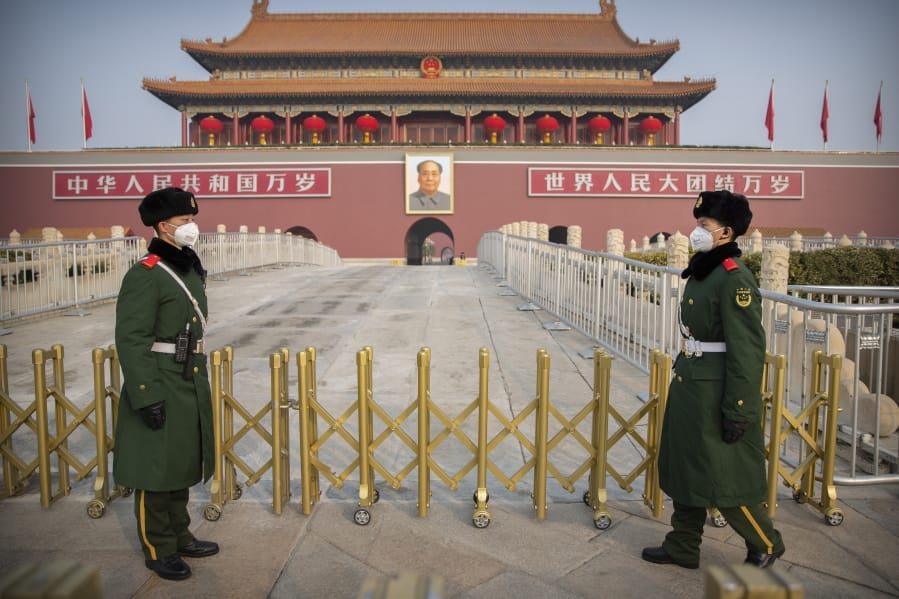BEIJING — China expanded its sweeping efforts on Monday to contain a dangerous new virus, extending the Lunar New Year holiday to keep the public at home and avoid spreading infection as the death toll rose to 81.
Mongolia closed its vast border with China, and Hong Kong and Malaysia announced they were barring entry to visitors from the Chinese province at the center of the outbreak following a warning by Chinese officials that the virus’ ability to spread was growing. Travel agencies were ordered to cancel group tours nationwide, adding to the rising economic losses.
Stock markets around the world were down sharply Monday as investors worried the outbreak could hurt the global economy. The Dow Jones Industrial Average fell as much as 550 points following a sell-off in in markets in Europe and Japan, and closed with a loss of 453 points, or 1.6 percent. Airlines, resorts and other companies that rely on travel and tourism suffered steep losses, while apparel and technology companies that get a significant amount of revenue from China also declined.
China has confirmed more than 2,700 cases of the new virus, most in the central city of Wuhan where the illness first surfaced last month. More than 40 cases have been confirmed elsewhere in the world with virtually all of them involving Chinese tourists or people who visited Wuhan recently.
China’s increasingly drastic containment efforts began with the Jan. 22 suspension of plane, train and bus links to Wuhan, a city of 11 million people in central China where the virus was first detected last month. That lockdown has expanded to 17 cities with more than 50 million people — the most far-reaching disease-control measures ever imposed.
The end of the Lunar New Year holiday, China’s busiest travel season, was pushed back to Sunday from Thursday to “reduce mass gatherings” and “block the spread of the epidemic,” a Cabinet statement said. The government of Shanghai, a metropolis of 25 million people and a global business center, extended the Lunar New York holiday by an additional week to Feb. 9. It ordered sports stadiums to close and religious events to cancel.
Tens of millions of people in China and around Asia had been due to crowd into planes, trains and buses to return to work after visiting their hometowns or tourist sites for the holiday. Schools will postpone reopening until further notice, the Cabinet said.
The death toll rose Monday when the southern island province of Hainan in the South China Sea reported its first fatality, an 80-year-old woman whose family arrived from Wuhan on Jan. 17.
Hubei province, where Wuhan is located, has accounted for 76 of the deaths reported so far. There have been one each in Shanghai and the provinces of Hebei in the north, Heilongjiang in the northeast and Henan in central China.
The spread of the illness is being watched around the globe, with a small number of cases appearing in other countries. Sri Lanka confirmed its first case Monday. Infections also have been confirmed in the United States, Thailand, Taiwan, Japan, South Korea, Vietnam, Singapore, Malaysia, Nepal, France, Canada and Australia.
As of Monday, there were five Americans diagnosed with the virus in Washington, Chicago, California and Arizona, all of whom had recently traveled to central China. U.S. health officials said they had no evidence the virus was spreading in the U.S. and they believe the risk remains low.
China also reported eight cases in Hong Kong and five in Macao. Dr. Chuang Shuk-kwan, the head of Hong Kong’s communicable disease branch, said the city’s eight cases all have Hubei ties, so there was no no sign yet that it is spreading to Hong Kong’s general population.
Mongolia is the second country to close its border with China, following North Korea. Neither has reported any cases of the virus. Mongolia also closed its schools, universities and playgrounds for more than a month — until March 2.
China’s No. 2 leader, Premier Li Keqiang, visited Wuhan to “guide epidemic prevention work,” the Cabinet website said. Photos showed Li, in a blue smock and green face mask, meeting hospital employees.
Later, the premier, wearing a face mask and a dark windbreaker, visited a supermarket in the beleaguered city. Shoppers, also wearing masks, cheered to him, “Happy New Year!”
“To get the epidemic under control in Wuhan and the good health of people in Wuhan will be good news for the whole country,” Li told the crowd.



